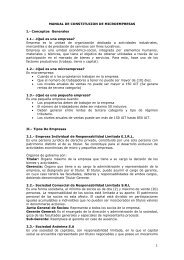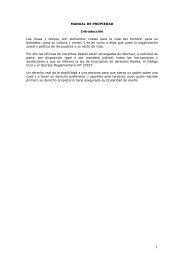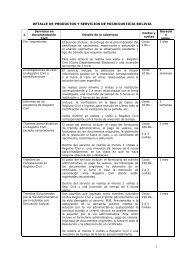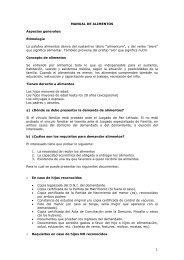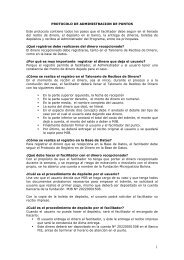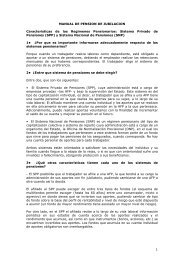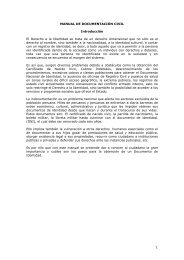ICISS report - International Coalition for the Responsibility to Protect
ICISS report - International Coalition for the Responsibility to Protect
ICISS report - International Coalition for the Responsibility to Protect
Create successful ePaper yourself
Turn your PDF publications into a flip-book with our unique Google optimized e-Paper software.
The <strong>Responsibility</strong> <strong>to</strong> <strong>Protect</strong> 43<br />
5.20 Intervening authorities have a particular responsibility <strong>to</strong> manage as swiftly and<br />
smoothly as possible <strong>the</strong> transfer of development responsibility and project implementation<br />
<strong>to</strong> local leadership, and local ac<strong>to</strong>rs working with <strong>the</strong> assistance of national and<br />
international development agencies.<br />
5.21 This is not only of importance <strong>for</strong> long-term development purposes, but also represents<br />
a positive rein<strong>for</strong>cement <strong>for</strong> short run security measures of <strong>the</strong> kind discussed above:<br />
a positive contribution is provided by a simultaneous ef<strong>for</strong>t at training <strong>the</strong> demobilized <strong>for</strong><br />
new income generating activities as well as <strong>the</strong> implementation of social and economic<br />
reintegration projects. The sooner <strong>the</strong> demobilized combatants are aware of <strong>the</strong>ir future<br />
options and opportunities, and <strong>the</strong> sooner <strong>the</strong> community has concrete and tangible<br />
demonstrations that civilian life can in fact return <strong>to</strong> normality under secure conditions, <strong>the</strong><br />
more positive will be <strong>the</strong>ir response in relation <strong>to</strong> disarmament and related issues.<br />
ADMINISTRATION UNDER UN AUTHORITY<br />
5.22 Useful guidelines <strong>for</strong> <strong>the</strong> behaviour of intervening authorities during a military<br />
intervention in failed states, and in <strong>the</strong> follow-up period, might be found in a constructive<br />
adaptation of Chapter XII of <strong>the</strong> UN Charter. This would enable reconstruction and<br />
rehabilitation <strong>to</strong> take place in an orderly way across <strong>the</strong> full spectrum, with <strong>the</strong> support and<br />
assistance of <strong>the</strong> international community. The most relevant provision in this regard is Article<br />
76 which notes that <strong>the</strong> aim of <strong>the</strong> system is <strong>to</strong> promote <strong>the</strong> political, economic, social and<br />
educational advancement of <strong>the</strong> people of <strong>the</strong> terri<strong>to</strong>ry in question; <strong>to</strong> encourage respect <strong>for</strong><br />
human rights; <strong>to</strong> ensure <strong>the</strong> equal treatment of all peoples in <strong>the</strong> UN in social, economic and<br />
commercial matters; and also <strong>to</strong> ensure equal treatment in <strong>the</strong> administration of justice.<br />
5.23 A fur<strong>the</strong>r element of Chapter XII which would often be of relevance <strong>to</strong> <strong>the</strong> populations<br />
of countries in which an intervention takes place relates <strong>to</strong> self-determination (Article 76.b).<br />
<strong>Protect</strong>ive en<strong>for</strong>cement usually indicates sustaining or res<strong>to</strong>ring <strong>for</strong>ms of terri<strong>to</strong>rial selfgovernment<br />
and au<strong>to</strong>nomy, and this in turn will usually mean elections being facilitated and<br />
possibly supervised, or at least moni<strong>to</strong>red, by <strong>the</strong> intervening authorities. That said, <strong>the</strong><br />
responsibility <strong>to</strong> protect is fundamentally a principle designed <strong>to</strong> respond <strong>to</strong> threats <strong>to</strong><br />
human life, and not a <strong>to</strong>ol <strong>for</strong> achieving political goals such as greater political au<strong>to</strong>nomy,<br />
self-determination, or independence <strong>for</strong> particular groups within <strong>the</strong> country (though <strong>the</strong>se<br />
underlying issues may well be related <strong>to</strong> <strong>the</strong> humanitarian concerns that prompted<br />
<strong>the</strong> military intervention). The intervention itself should not become <strong>the</strong> basis <strong>for</strong> fur<strong>the</strong>r<br />
separatist claims.<br />
5.24 There is always likely in <strong>the</strong> UN <strong>to</strong> be a generalized resistance <strong>to</strong> any resurrection of<br />
<strong>the</strong> “trusteeship” concept, on <strong>the</strong> ground that it represents just ano<strong>the</strong>r kind of intrusion<br />
in<strong>to</strong> internal affairs. But “failed states” are quite likely <strong>to</strong> generate situations which <strong>the</strong><br />
international community simply cannot ignore, as happened – although <strong>the</strong>re <strong>the</strong> intervention<br />
was less than successful – in Somalia. The strongest argument against <strong>the</strong> proposal<br />
is probably practical: <strong>the</strong> cost of such an operation <strong>for</strong> <strong>the</strong> necessarily long time it would<br />
take <strong>to</strong> recreate civil society and rehabilitate <strong>the</strong> infrastructure in such a state. There must be<br />
real doubts about <strong>the</strong> willingness of governments <strong>to</strong> provide those kinds of resources, o<strong>the</strong>r<br />
than on a very infrequent and ad hoc basis.



